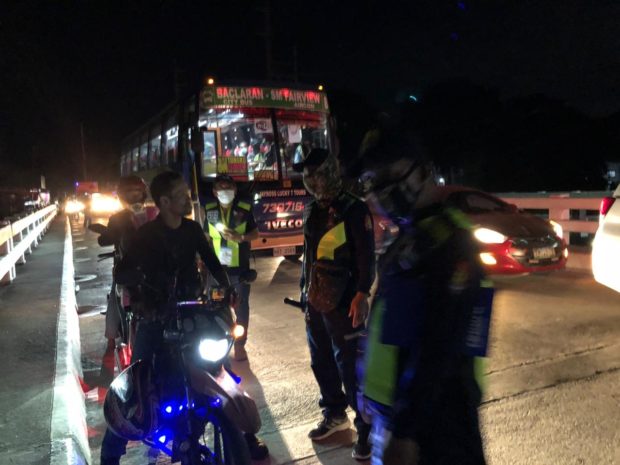MANILA, Philippines — The Department of the Interior and Local Government (DILG) on Sunday began regulating and monitoring access to Metro Manila and its adjacent provinces, generally known as the National Capital Region (NCR) Plus, by establishing quarantine control points (QCPs) manned by security officers at the region’s borders.
The QCPs will regulate the entry and exit of people in the NCR Plus bubble which, according to DILG Secretary Eduardo Año, is in compliance with the Inter-Agency Task Force for the Management of Emerging Infectious Diseases (IATF) Resolution No. 130-A.
“As per the IATF Resolution, only Authorized Persons Outside of Residence (APOR) shall be allowed to enter and leave the NCR Plus area,” he said.
“At the moment, the QCPs are at the borders of Bulacan, Rizal, Laguna and Cavite with adjoining provinces but once we move to ECQ starting August 6, checkpoints will now be located inside Metro Manila,” he added.
IATF Resolution No. 130-A, placed added and heightened restrictions in the National Capital Region Plus area, before it is placed under enhanced community quarantine (ECQ) on August 6.
“The implementation of strict border controls for people entering and leaving the NCR Plus bubble is critical to stopping the spread of the Delta variant,” said Año.
According to DILG Undersecretary and Spokesperson Jonathan Malaya, those considered APOR shall present to police authorities manning the QCPs any of the following:
- IATF IDs issued by regulatory agencies; or
- Valid IDs or pertinent documentation issued by establishments allowed to operate under the current quarantine classification;
- Other proof or evidence that the purpose of travel is allowed.
Meanwhile those considered as APOR under the Omnibus Guidelines are:
- Health and emergency frontline services and uniformed personnel
- Government officials and employees on official travel
- Duly-authorized relief and humanitarian assistance actors
- Persons travelling for medical or humanitarian reasons
- Persons going to and from the airport
- Anyone crossing zones for work in permitted industries
- Public utility vehicle operators
Malaya reminded the PNP to allow the free movement of cargo/delivery vehicles across all quarantine control points because these are important to the economy.
“Secretary Año has instructed all QCPs to allow the unimpeded movement of cargo trucks and delivery vehicles especially those carrying food items across all our checkpoints,” he said.
Aside from the QCPs, Año said the PNP may also install regular checkpoints within the NCR Plus to maximize the implementation of curfew hours, the enforcement of minimum health standards, and the general law.
Año then reminded the PNP to always observe the rule of law and the rules of engagement while implementing strict health protocols.
The NCR Plus is scheduled to be placed under ECQ from August 6 to August 20 amid the rising cases of the more-transmissible COVID-19 Delta variant.
Before the scheduled lockdown, however, the region is currently under general community quarantine “subject to heightened restrictions with additional restrictions” until August 5.
RELATED STORIES:
COVID-19 vaccination to proceed even during ECQ in Metro Manila — Palace
DOH: Experts fear NCR COVID-19 case increase by September despite lockdown
Gov’t scrambles to find funding for ECQ aid
